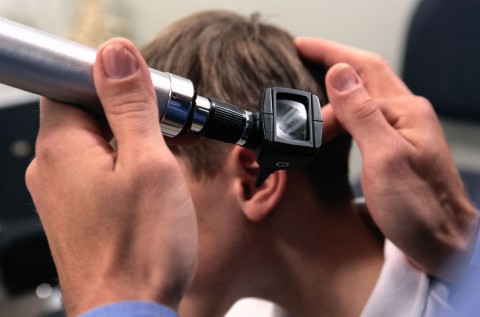 Would you like to work directly with patients on an issue that profoundly affects how they live and communicate? Would you like to combine an interest in healthcare with an interest in communication and language? If so, then a career as an audiologist may be the perfect fit for you.
Would you like to work directly with patients on an issue that profoundly affects how they live and communicate? Would you like to combine an interest in healthcare with an interest in communication and language? If so, then a career as an audiologist may be the perfect fit for you.
An audiologist is a medical specialist who treats patients with varying degrees of hearing loss or consequential balance issues. These patients rely on audiologists to help diagnose their issues and propose a suitable treatment plan. Hearing loss can have a significant impact on the lives of both individuals and their families. An audiologist works to improve the quality of life for everyone involved with a caring and professional approach. With growing opportunities to work with people of all ages, audiology can be an interesting and rewarding career path for those interested in direct patient care.
What does an audiologist typically do?
Audiology is a patient-focused profession, and those in the field can expect that the majority of their duties will involve working directly with people. An audiologist might, for instance, have opportunities to speak directly with patients to gauge hearing loss, to physically examine the ear canal or to utilize audiometers and computer software that measure the volume of sounds that a patient’s ear can distinguish.
When treatment is required, it may range from simple clearing of blockage due to excess ear wax to the more advanced fitting and programming of cochlear implants. For many patients, an audiologist can expect to work with the latest hearing aids and maintain continued follow-ups with patients for maintenance and refitting as needed.
The duties of an audiologist do not end with the patient, however. An audiologist might spend time advising family members on how best to work with someone who has hearing loss, typically done through lip reading or sign language. As discussed above, hearing loss can profoundly affect the day-to-day life of individuals and their families, so an audiologist may also work with family members and loved-ones to help ease the transition for all those involved.
Where do audiologists work?
An audiologist may be self-employed or may work with larger healthcare organizations. Audiologists may also specialize in treating specific types of patients, such as children or the elderly. If you are interested in working with children, for example, you might be attached to a specific school district, or you might travel between several different schools and other child care facilities during your work day. Most audiologists work full-time and may be required to work during weekends to meet with certain patients.
Audiologist job outlook and salary potential
Audiology is a relatively small occupation, with about 13,000 licensed audiologists working in the U.S. in 2010. However, an aging population with increasing levels of hearing loss leads the U.S. Bureau of Labor Statistics (BLS) to predict a 37 percent growth rate in the field from 2010 to 2020, generating about 4,800 new jobs. Furthermore, continued improvements in hearing aid technology may entice more people with hearing issues to seek treatment, increasing demand for an audiologist’s services. The link between age and hearing loss also suggests that opportunities may be particularly abundant in areas with a large number of retirees.
The BLS notes a median annual wage of $66,660 in May 2010 for audiologists. The lowest 10 percent of workers in terms of salary reported earning less than $42,590 annually, while the top 10 percent reported earning greater than $102,210.
What education or training is required?
There are two requirements to practice audiology. A doctoral degree in audiology (Au.D.) is required along with licensure, as required by your particular state. An Au.D. program, which requires a bachelor’s degree, includes coursework in anatomy, physiology, physics, genetics, normal and abnormal communication development, diagnosis and treatment, pharmacology and ethics. It also includes many hours of clinical practice and observation.
Please note that some states require graduation from a program accredited by the Council on Academic Accreditation. If you are considering enrolling in an unaccredited program, you should contact your state’s audiology licensing board to see whether your state will allow you to take the licensure exam upon graduation from that particular school.









